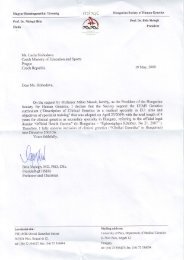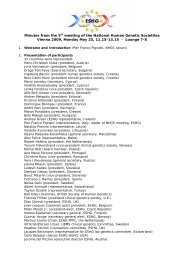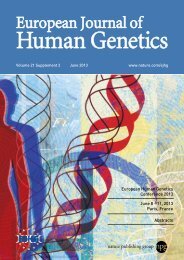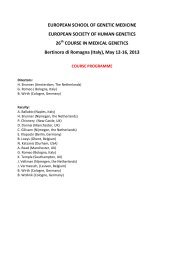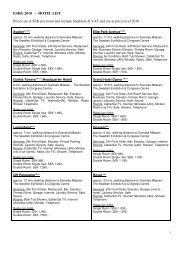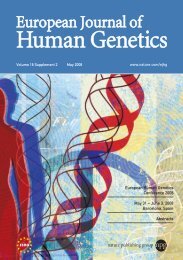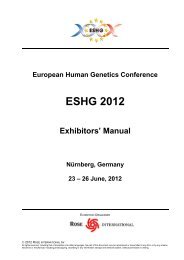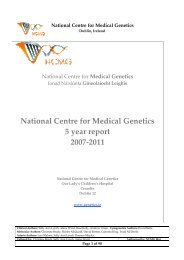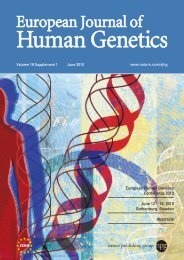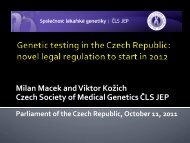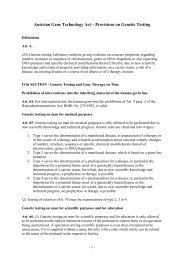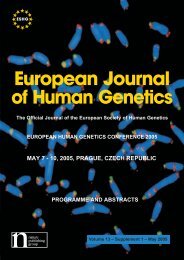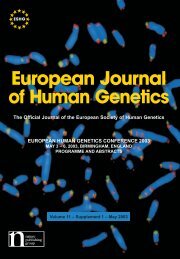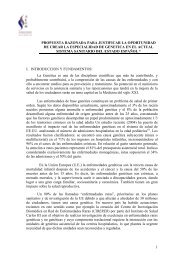2009 Vienna - European Society of Human Genetics
2009 Vienna - European Society of Human Genetics
2009 Vienna - European Society of Human Genetics
You also want an ePaper? Increase the reach of your titles
YUMPU automatically turns print PDFs into web optimized ePapers that Google loves.
Genetic counseling <strong>Genetics</strong> education, Genetic services, and Public policy<br />
P01.27<br />
Genetic screening programmes in Europe<br />
P. Javaher1 , E. Nyoungui1 , H. Kääriäinen2 , U. Krist<strong>of</strong>fersson3 , I. Nippert4 , J.<br />
Sequeiros5 , J. Schmidtke1 ;<br />
1 2 Medical School <strong>of</strong> Hannover, Hannover, Germany, Finland and National<br />
Public Health Institute, Helsinki, Finland, 3University Hospital, Lund, Sweden,<br />
4 5 Universitaetsklinikum Muenster, Muenster, Germany, Institute for Molecular<br />
and Cell Biology and ICBAS, University Porto, Porto, Portugal.<br />
Objectives: Genetic screening is defined as any kind <strong>of</strong> test performed<br />
systematically for the early detection or exclusion <strong>of</strong> a genetic disease,<br />
genetic predisposition or resistance to a disease, or to determine<br />
whether a person carries a gene variant, that may produce disease in<br />
his or her <strong>of</strong>fspring.<br />
Methods: This survey intends to present the current (2006-2008) status<br />
<strong>of</strong> genetic screening programmes as a best-effort collection <strong>of</strong> the genetic<br />
screening landscape in selected <strong>European</strong> countries, building on<br />
a first assessment <strong>of</strong> genetic screening programmes in Germany with<br />
the production <strong>of</strong> a final report in 2003. The data collection was performed<br />
on the basis <strong>of</strong> sources via internet, including PubMed search,<br />
websites <strong>of</strong> national screening authorities and societies and some other<br />
organisations, as well as data from a self-designed questionnaire,<br />
addressing the conditions screened in prenatal, population-based carrier,<br />
and cascade screening programmes, and organisational aspects<br />
<strong>of</strong> screening programmes in selected <strong>European</strong> countries.<br />
Results and discussion: In almost all countries, there are nationwide<br />
newborn screening programmes for PKU (in Finland as regional programme<br />
targeted to immigrants) and for CH. Apart from Estonia, Finland,<br />
Latvia, Lithuania, Norway and Slovenia there are other conditions<br />
screened in different countries. These additional conditions vary<br />
per country, sometimes depending on prevalence but more <strong>of</strong>ten for<br />
historical and/or political reasons. A data comparison shows that there<br />
is a heterogeneity in conditions screened, screening methods, organisational<br />
aspects <strong>of</strong> screening programmes, and conditions screened<br />
in prenatal, population-based carrier, and cascade screening programmes<br />
among the <strong>European</strong> countries surveyed.<br />
P01.28<br />
People’s concerns and attitudes towards genetic testing for<br />
multifactorial diseases<br />
V. V. Markova, O. A. Makeeva, V. P. Puzyrev;<br />
Research Institute <strong>of</strong> Medical <strong>Genetics</strong> SB RAMS, Tomsk, Russian Federation.<br />
The high rate <strong>of</strong> genetic technologies developments and their forthcoming<br />
application into disease management and other spheres <strong>of</strong> life<br />
provoke a lot <strong>of</strong> concerns about its short- and long-term effects both in<br />
lay people and health care pr<strong>of</strong>essionals .<br />
A survey <strong>of</strong> 2000 Russian respondents had been conducted to study<br />
peoples’ attitudes towards different aspects <strong>of</strong> genetic testing.<br />
Results: 85% <strong>of</strong> respondents expressed their desire “to know more<br />
about genome”; 68% <strong>of</strong> survey participants would like to know about<br />
probable future diseases; and 89% believed they would try to change<br />
their lifestyle or take medications in order to avoid a disease if a high<br />
risk were identified. Among the reasons which can force people to undergo<br />
genetic testing the most important was people’s anxiety about<br />
health which was related to the self-reported individuals’ health status.<br />
18% <strong>of</strong> respondents answered that “nothing” can prevent them from<br />
undergoing genetic testing for disease predisposition. At the same<br />
time 48% believed that if genetic testing results will be publicaly available,<br />
tested people can be discriminated in society.<br />
Results <strong>of</strong> the survey confirm the high level <strong>of</strong> public interest and a very<br />
positive perception <strong>of</strong> novel genomic technologies as well as highly<br />
overestimated expectations which call for special efforts in educating<br />
lay people and health care pr<strong>of</strong>essionals. The high level <strong>of</strong> people’s<br />
concerns about genetic discrimination agues for the necessity <strong>of</strong> regulation<br />
in this sphere.<br />
P01.29<br />
EuroGenGuide: Patient Led Education and Development for<br />
Genetic Testing in Research and Medicine<br />
A. J. McKeown, VSOP, The Netherlands, Milan Policlinico, Italy, University<br />
<strong>of</strong> Muenster, Germany, WANDA, The Netherlands, Heart UK, EFB, The Netherlands,<br />
CEEGN, Croatia, GAMIAN, Romania, Fighting Blindness, Republic<br />
<strong>of</strong> Ireland, Health Coalition Initiative, UK, Rare Disorders Belgium, Alzheimer<br />
Europe, Belgium;<br />
Genetic Interest Group, London, United Kingdom.<br />
EuroGenGuide is a EC-funded project, aiming to provide information<br />
about genetic testing and research to patients, the wider public and<br />
health pr<strong>of</strong>essionals. The information will take the form <strong>of</strong> a ‘manual’in<br />
two parts: one with information for patients or people considering taking<br />
part in research and the other with educational materials about<br />
genetics for health pr<strong>of</strong>essionals.<br />
There is considerable disparity in Europe between the relatively widespread<br />
availability <strong>of</strong> genetic tests and therapies, and the uneven<br />
distribution <strong>of</strong> information and access to both these and counselling<br />
services for those affected by genetic disorders. EuroGenGuide aims<br />
to reach into areas where information is limited or where clinicians<br />
and patients know little about genetics and the resources available to<br />
them in taking advantage <strong>of</strong> genetic technology and services, and help<br />
to resolve this <strong>of</strong>ten life-determining gap. EuroGenGuide’s two-part<br />
manual will provide a readily-accessible comprehensive document<br />
and website for use by all which will help to generate a robust model <strong>of</strong><br />
informed consent for those making decisions based on their options in<br />
respect <strong>of</strong> genetic testing or research.<br />
The EuroGenGuide team is comprised <strong>of</strong> thirteen organisations from<br />
across Europe, and co-ordinated from London by the Genetic Interest<br />
Group. Now in its final year, the EuroGenGuide team is working to<br />
publicise and raise the pr<strong>of</strong>ile <strong>of</strong> the guide ready for its launch in December<br />
<strong>2009</strong>. Please feel free to get involved by registering to receive<br />
the newsletter, take the user survey and discuss issues <strong>of</strong> relevance<br />
on the forum, at http://www.eurogenguide.eu.<br />
P01.30<br />
<strong>Genetics</strong> education for dental students<br />
D. T. Stefanescu 1 , N. Scribanu 2 , E. Severin 3 ;<br />
1 Genetic Lab, Bucharest, Romania, 2 Georgetown Univ Medical Ctr, Washington,<br />
DC, United States, 3 ”Carol Davila” Univ Med Pharm, Bucharest, Romania.<br />
The aim <strong>of</strong> this study is to optimize the genetics education <strong>of</strong> dental<br />
students and residents based on the implications and applications <strong>of</strong><br />
genetic knowledge and skills to dental health and patient care.<br />
Materials and Methods: It was found a rich literature using PubMed<br />
search for articles on the topic studied. We used clinical cases in the<br />
collection <strong>of</strong> our genetics department too.<br />
Results - The study <strong>of</strong> literature has enabled us evidence <strong>of</strong> many examples<br />
that demonstrate the use <strong>of</strong> genetic research in clinical practice:<br />
the identification <strong>of</strong> gene mutations that cause isolated inherited dental<br />
anomalies, gene mutations with pleiotropic effects, genetic testing for<br />
oral cancer susceptibility and pre-symptomatic diagnosis <strong>of</strong> periodontal<br />
disease. Changes <strong>of</strong> genetic structure produce the large diversity that<br />
may be encountered in clinical practice. In dental schools, educators<br />
and academic staff provide the opportunity for students to learn how<br />
to translate genes into dental health.Therefore, students and residents<br />
should be trained to understand the impact <strong>of</strong> genetic modifications<br />
on oral health, to recognize genetically determined or environmentally<br />
induced anomalies, to know the genetic tests available to identify the<br />
cause <strong>of</strong> diseases or abnormalities <strong>of</strong> crani<strong>of</strong>acial complex, to provide<br />
the patient best treatment possible based on the genetic pr<strong>of</strong>ile and<br />
guide the patient to genetic counseling.<br />
Conclusions - <strong>Genetics</strong> has the potential to shape the dental education<br />
and practice. In the context <strong>of</strong> genetic medicine, the dentist will<br />
integrate the tools <strong>of</strong> genetics in their dental practice for prediction,<br />
prevention and personalized therapy.<br />
P01.31<br />
<strong>Genetics</strong> Made Easy - Non-pr<strong>of</strong>it informative web site on <strong>Human</strong><br />
<strong>Genetics</strong><br />
M. T. Solé-Pujol 1 , J. M. Carrera-Macia 2 , J. M. Cantú-Garza 3 , F. Solé-Ristol 4 , J.<br />
Antich-Femenias 1 ;<br />
1 Centro Genética Médica, Barcelona, Spain, 2 Instituto Universitario Dexeus.,<br />
Barcelona, Spain, 3 Instituto Mejicano del Seguro Social., Guadalajara (Jalisco),<br />
Mexico, 4 Hospital del Mar, Barcelona, Spain.<br />
EDUCATIONAL web site on human genetics.<br />
GENETICS MADE EASY http://www.geneticsmadeeasy.com<br />
<strong>Genetics</strong> made easy is a non-pr<strong>of</strong>it informative web site on <strong>Human</strong> <strong>Genetics</strong><br />
that brings general population and scientific community closer<br />
together. The principal aim <strong>of</strong> the web site is to disseminate the scientific<br />
advances and knowledge that take place in genetics and how the<br />
general population (students, couples wanting to have a baby, clini-



